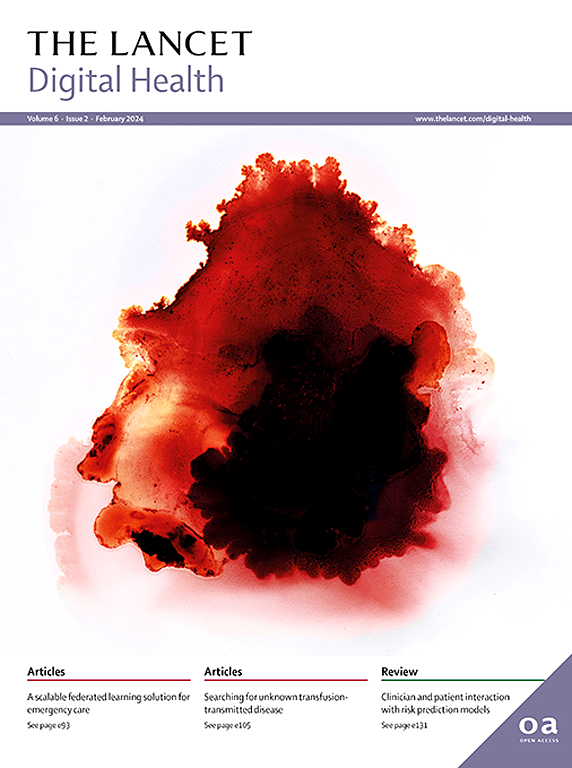评估结合远程监测和远程干预的移动医疗技术与常规护理在脆弱期心力衰竭管理(HERMeS)中的作用:一项多中心、随机对照试验。
IF 24.1
1区 医学
Q1 MEDICAL INFORMATICS
引用次数: 0
摘要
背景:据我们所知,结合远程监测和远程干预的移动医疗(mHealth)技术作为一种非侵入性干预措施,在出院后早期(即脆弱期)降低心力衰竭患者心血管事件风险的潜力尚未得到评估。我们调查了将移动健康纳入易危期患者常规心力衰竭管理的有效性。方法:通过远程监测和电子健康支持减少心力衰竭事件(HERMeS)试验是一项为期24周、随机、对照、开放标签、模糊终点判断的3期试验,在西班牙有心力衰竭管理经验的10个中心(医院[n=9]和初级保健服务[n=1])进行。我们招募了根据2016年欧洲心脏病学会标准(试验开始时的现行临床实践指南)诊断为心力衰竭的成年人(年龄≥18岁),他们最近(在入组前30天内)因心力衰竭失代偿而出院,或正在出院计划过程中。出院后,参与者通过网络系统集中随机分配(1:1)到移动医疗,包括远程监控和通过视频会议预先计划的结构化医疗保健随访,或根据每个中心的心力衰竭护理框架(包括护士主导的教育方案)进行常规护理。主要结局是在6个月的随访期间心血管死亡或心衰事件恶化发生率的综合结果,在意向治疗原则的完整分析集中通过首次事件的时间分析进行评估。没有计划对危害信息进行前瞻性系统收集。HERMeS试验已在ClinicalTrials.gov注册,注册号为NCT03663907,并已完成。研究结果:从2018年5月15日到2022年4月4日,506名参与者(207名[41%]女性和299名[59%]男性)被随机分配:255名参加移动健康,251名参加常规护理。参与者的平均年龄为73岁(SD 13)。移动健康组255名参与者中有51人(20%)过早结束随访,常规护理组251名参与者中有36人(14%)过早结束随访。在移动健康组的随访期间,255名参与者中有43人(17%)发生心血管死亡或心力衰竭恶化事件,而常规护理组的251名参与者中有102人(41%)发生心血管死亡(时间与首次事件的风险比为0.35 [95% CI 0.24 - 0.50];结论:与常规护理相比,基于移动健康的心力衰竭护理结合远程干预和远程监测可降低因心力衰竭失代偿而近期入院的患者发生新的致命性和非致命性心血管事件的风险。通过鼓励将移动医疗整合到临床实践指南中,目前的研究结果可以帮助改善出院后过渡时期心力衰竭患者的护理。资金:爱马仕的试验是由诺华公司无限制的资助。本文章由计算机程序翻译,如有差异,请以英文原文为准。
Evaluation of mobile health technology combining telemonitoring and teleintervention versus usual care in vulnerable-phase heart failure management (HERMeS): a multicentre, randomised controlled trial
Background
The potential of mobile health (mHealth) technology combining telemonitoring and teleintervention as a non-invasive intervention to reduce the risk of cardiovascular events in patients with heart failure during the early post-discharge period (ie, the vulnerable phase) has not been evaluated to our knowledge. We investigated the efficacy of incorporating mHealth into routine heart failure management in vulnerable-phase patients.
Methods
The Heart Failure Events Reduction with Remote Monitoring and eHealth Support (HERMeS) trial was a 24-week, randomised, controlled, open-label with masked endpoint adjudication, phase 3 trial conducted in ten centres (hospitals [n=9] and a primary care service [n=1]) experienced in heart failure management in Spain. We enrolled adults (aged ≥18 years) with heart failure diagnosed according to the 2016 European Society of Cardiology criteria (then-current clinical practice guidelines at the initiation of the trial) who had recently been discharged (within the preceding 30 days of enrolment) from a hospital admission that was due to heart failure decompensation, or who were in the process of discharge planning. After discharge, participants were centrally randomly assigned (1:1) via a web-based system to mHealth, comprising telemonitoring and preplanned structured health-care follow-up via videoconference, or usual care according to each centre’s heart failure care framework including a nurse-led educational programme. The primary outcome was a composite of the occurrence of cardiovascular death or worsening heart failure events during the 6-month follow-up period, assessed by time-to-first-event analysis in the full analysis set by the intention-to-treat principle. No prospective systematic collection of harms information was planned. The HERMeS trial is registered with ClinicalTrials.gov, NCT03663907, and is completed.
Findings
From May 15, 2018, to April 4, 2022, 506 participants (207 [41%] women and 299 [59%] men) were randomly assigned: 255 to mHealth and 251 to usual care. The mean age of participants was 73 years (SD 13). Follow-up ended prematurely in 51 (20%) of 255 participants in the mHealth group and 36 (14%) of 251 in the usual care group. During follow-up in the mHealth group, cardiovascular death or a worsening heart failure event occurred in 43 (17%) of 255 participants, compared with 102 (41%) of 251 in the usual care group (hazard ratio for time to first event 0·35 [95% CI 0·24–0·50]; p<0·0001; relative risk reduction 65% [95% CI 50–76]). No spontaneously reported harms were reported in either group during follow-up.
Interpretation
mHealth-based heart failure care combining teleintervention and telemonitoring reduced the risk of new fatal and non-fatal cardiovascular events compared with usual care in people with a recent hospital admission due to heart failure decompensation. The current findings could help to improve the care of patients with heart failure in the transitional post-discharge period by encouraging integration of mHealth into clinical practice guidelines.
Funding
The HERMeS trial was funded by an unrestricted grant from Novartis.
求助全文
通过发布文献求助,成功后即可免费获取论文全文。
去求助
来源期刊

Lancet Digital Health
Multiple-
CiteScore
41.20
自引率
1.60%
发文量
232
审稿时长
13 weeks
期刊介绍:
The Lancet Digital Health publishes important, innovative, and practice-changing research on any topic connected with digital technology in clinical medicine, public health, and global health.
The journal’s open access content crosses subject boundaries, building bridges between health professionals and researchers.By bringing together the most important advances in this multidisciplinary field,The Lancet Digital Health is the most prominent publishing venue in digital health.
We publish a range of content types including Articles,Review, Comment, and Correspondence, contributing to promoting digital technologies in health practice worldwide.
 求助内容:
求助内容: 应助结果提醒方式:
应助结果提醒方式:


